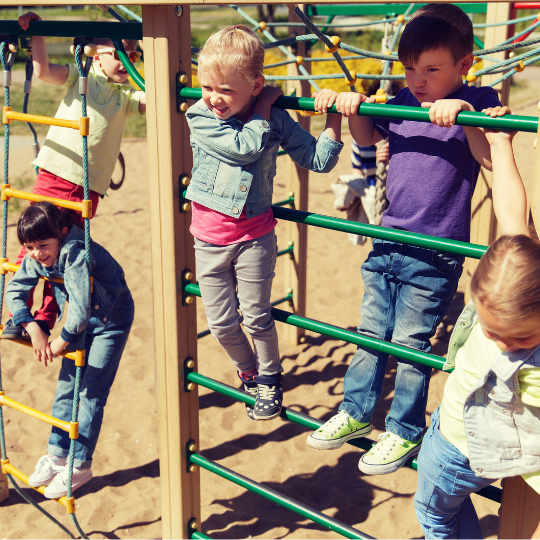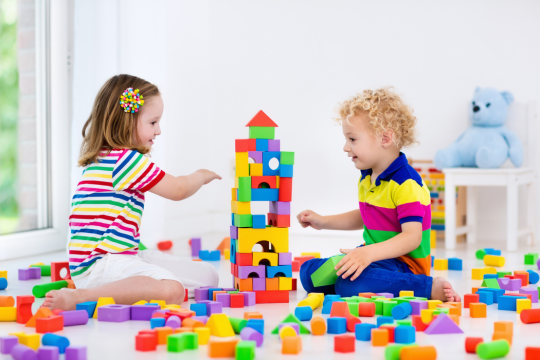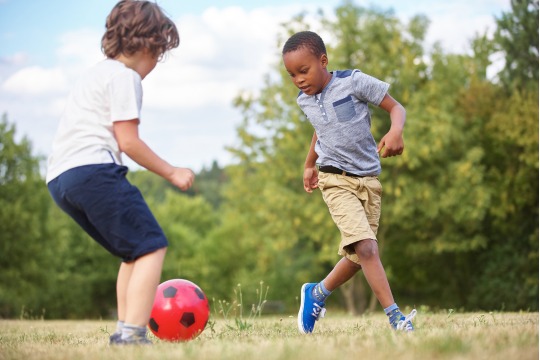The Role of Playtime: A Deep Dive into its Impact on Childhood Development

Playtime is often dismissed as mere child's play, yet it's the cornerstone of cognitive and physical growth. Delving beneath its playful exterior reveals a rich tapestry of developmental benefits. This activity is not just about fun; it's a critical part of growing up, molding young minds and bodies in surprising ways.
In this article, we'll take a look at the role of playtime in children's lives, highlighting its crucial contributions to cognitive learning and physical development.
The Importance of Playtime
Playtime is not just a pastime; it is a fundamental aspect of healthy child development skills. According to renowned developmental psychologist Jean Piaget, playtime is the work of childhood, through which children explore the world around them, experiment with new ideas, and develop critical skills. Whether it's building with blocks, pretending to be superheroes, or engaging in imaginative role-playing, playtime provides children with endless opportunities to learn and grow.
Cognitive Development Benefits
- Enhanced Problem-Solving Skills: Playtime gives the opportunity for children to think creatively and come up with solutions to various challenges they encounter during playtime. Whether it's figuring out how to build a tower with blocks or strategizing during a game of pretend, balance in children develops critical thinking skills and problem-solving skills that are essential for success in later life.
- Improved Language Development: Playtime often involves communication with peers, whether it's negotiating crucial roles in a game or narrating a story. Through these interactions, children develop language skills, expand their vocabulary, and learn the nuances of social communication.
- Stimulated Imagination and Creativity: Imaginative playtime allows children to explore limitless possibilities, fostering creativity and innovation. Whether they're pretending to be pirates sailing the high seas or inventing fantastical worlds, children stretch their imaginations and learn to think outside the box.
- Promoted Emotional Regulation: Playtime provides a safe space for children to express and regulate their emotions. Whether they're acting out scenarios from their own lives or exploring complex feelings through playtime, children learn to manage their emotions and develop empathy for others.

Physical Development Benefits
- Enhanced Gross Motor Skills: Active playtime, such as running, jumping, and climbing, helps children develop strong muscles and coordination. Whether they're playing tag in the backyard or navigating a jungle gym at the playground, children hone their gross motor skills and improve their physical fitness.
- Improved Fine Motor Skills: Activities like drawing, painting, and building with blocks require precise hand-eye coordination and dexterity. Through these activities, children develop fine motor skills that are essential for tasks like writing, drawing, and manipulating objects.
- Increased Spatial Awareness: Playtime often involves navigating physical space and understanding spatial relationships. Whether it's arranging blocks to build a structure or navigating a maze, children develop spatial awareness and problem-solving skills that are crucial for tasks like reading maps and understanding geometry.
- Promoted Physical Fitness: Active playtime not only strengthens muscles and coordination but also promotes overall physical fitness. Regular physical activity during childhood sets the foundation for a healthy lifestyle later in life, reducing the risk of obesity and related health problems.

Promoting Play in Everyday Life
As parents, caregivers, and educators, it's essential to recognize the importance of playtime in children's lives and create opportunities for playtime in everyday life. Here are some tips for promoting playtime:
- Provide Open-Ended Toys: Choose toys that encourage open-ended play and allow children to use their imagination. Blocks, dolls, art supplies, and dress-up clothes are excellent choices that promote creativity and exploration.
- Create Playful Environments: Designate a space in your home or classroom where children can engage in unstructured play. Fill it with toys, books, and art supplies to inspire creativity and exploration.
- Encourage Outdoor Play: Take advantage of outdoor spaces like parks, playgrounds, and nature trails to promote active playtime and exploration. Outdoor activities provide children with fresh air, natural scenery, and ample space to run, jump, and explore.
- Join in the Fun: Play with your children and participate in their building games and activities. Not only does this strengthen your bond with your child, but it also sets a positive example and encourages them to engage in all types of activities.
- Limit Screen Time: While technology has its benefits, excessive screen time can interfere with children's natural inclination to play and explore. Set limits on screen time and encourage activities for children that promote active, imaginative playtime.
FAQ'S:
Why is playtime important for children's development? Playtime is crucial for child development because it provides them with opportunities to explore, experiment, and learn in a safe environment and enjoyable environment. Through play, children develop essential cognitive, social, emotional, and physical skills that lay the foundation for future success. It promotes creativity, problem-solving, language development, emotional development, and physical health, shaping children into well-rounded individuals.
What types of activities are beneficial for children's cognitive development? Various types of activities contribute to children's cognitive development. Imaginative activities, such as pretend and role-playing, stimulates creativity, language development, and cognitive skills. Constructive activities, which involves building and creating with blocks, Legos, or other materials, enhances spatial awareness, fine motor skills, and logical thinking. Concepts of games and puzzles also promote cognitive functions such as memory, attention, and strategic thinking.
How does playtime contribute to physical development in children? Playtime is essential for physical development as it encourages children to engage in physical activity, thereby strengthening muscles, improving coordination, and promoting overall physical fitness. Active play, such as running, jumping, climbing, and playing sports, enhances gross motor skills and cardiovascular health. Fine motor skills are developed through activities like drawing, painting, and manipulating small objects, which require hand-eye coordination and dexterity.
Can playtime help children develop social skills? Yes, playtime plays a significant role in the healthy development of social skills in children. When children engage in cooperative play with peers, they learn important social skills such as sharing, taking turns, negotiating, and resolving conflicts. Through pretend play, children practice empathy, perspective-taking, and understanding social roles and relationships. Play provides a natural context for children to learn and practice social skills essential for building positive relationships and functioning effectively in society.
How can parents and caregivers promote playtime in children's lives? Parents and caregivers can provide a variety of toys and materials that encourage open-ended play and creativity. Creating playful environments both indoors and outdoors, and actively participating in playtime with children, fosters engagement and learning. Limiting screen time and providing ample opportunities for unstructured activities allow children to explore their interests and develop important cognitive skills.
Final Thoughts
Playtime is far more than just a way for children to pass the time; it is a vital aspect of their cognitive function and physical development. From fostering creativity and problem-solving skills to promoting physical fitness and social development, playtime shapes children in profound ways. By recognizing the importance of playtime and creating opportunities for children to engage in meaningful experiences, we can help them reach their full potential and lay the foundation for a lifetime of learning and growth.

